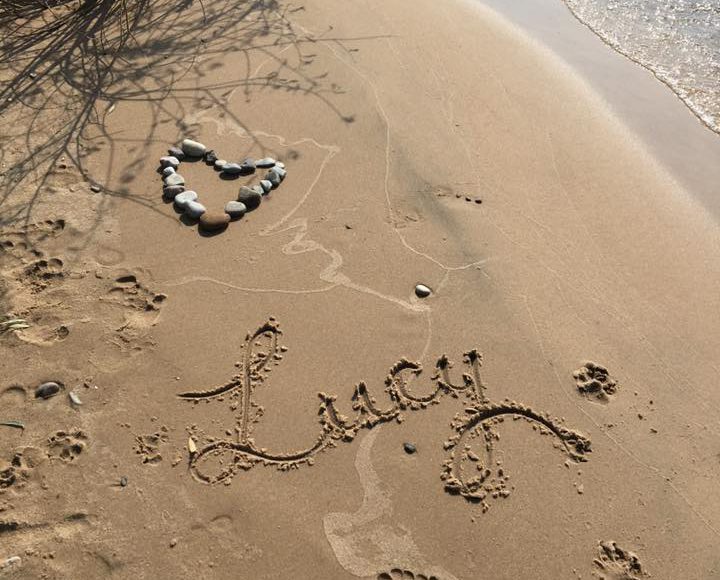Throughout this blog I’ve been relatively open about my feelings as I’ve processed my grief and anxiety over the past couple of years. However, I’ve left out many pieces of the story in fear of additional emotional backlash, both for myself and some of my loved ones. As an individual, and especially as a teacher, I’ve become an expert at sugarcoating things and putting on a smile for the sake of others. This hasn’t always served me well. With some recent changes in family dynamics, along with my own progress with what I like to call ‘heart work’, I’ve reached the point where I realize that habit no longer works for me, at least not here in this space. The whole point of this blog is to be authentic and real about my experiences, and I can’t do that if I’m always dancing around subjects. The truth is often harsh, but to ignore the truth is ingenuine.
When I started seeing a grief therapist, I went into it with the correct assumption I’d be addressing and dealing with the grief of losing Lucy. I was given valuable advice and tools for coping. I was listened to. I was treated with empathy and respect. I was able to begin the healing process. What I didn’t expect was that my loss trauma was going to trigger the resurfacing of past trauma. As I talked my way through the darkest moments of my life, I realized that the way I was personally coping with our loss was largely influenced by things I’d experienced and habits I’d picked up during my youth, especially adolescence.
The thing with grief is that there can be so much anger. Without channeling that anger somewhere, it can be a lot to bear. I have always directed my anger inward, at myself. I’ve always been my own worst enemy, for as long as I can remember. While some of that is part of my personality, I can honestly say that trait was fostered with great tenacity by one of my parents. As my step-dad and eventually adoptive father, the man in charge of our family made our home life a living hell. Yes, my younger sisters and I always had what we needed- food in our bellies, a roof over our heads, lots of toys and things to do, a loving mom who always tried her hardest to show us we were loved, etc.- but we were emotionally and verbally abused daily. An alcoholic with narcissist tendencies, Dad seemed hell-bent on destroying the self-esteem of all of us. Without a doubt, he succeeded.
Why am I writing about this? Because the truth heals me. In light of my mom leaving him after nearly three decades, since he can no longer control her, he needs to attempt to control how others see her. No surprise. He is doing the same to me and my sisters. This is simply one way that I can defend my mom’s, my sisters’, and my own behavior through this family change. However, I’m certain that if he ever reads this, he’ll say I’m a liar or twisting the truth, and he’ll really believe that. He always believes it’s everyone else’s fault. It’s not about putting him on blast, nor is it a cry for sympathy of any kind. This part of my story has simply been instrumental in my life after loss, and I’m tired of dancing around the truth for potentially offended people who care nothing about my feelings. Of course, I can only talk about my own experience and the impact he’s had on me. I’m not necessarily speaking on behalf of my siblings or my mom, but I believe the hurt goes even deeper for them, having spent more time living under the same roof as him. Knowing how much I’ve been personally affected, that thought makes me so sad.
A commonly quoted Maya Angelou phrase has always hit home for me. She famously said, “I’ve learned that people will forget what you said, people will forget what you did, but people will never forget how you made them feel.” While I do remember quite a bit of what was said and done in our home over the years, some things have been purposely pushed from my memory. However, I’ve never forgotten (nor will never forget) how that man made me feel through my adolescence and beyond. Like a worthless piece of trash. After being told countless times how I’d “fall flat on my face” in life, and sarcastically encouraged to “prove him wrong”, He laughed at me when I chose my life’s work– teaching– because I “have no backbone” and once more, reiterated that I’d “fall flat on my face”. I really believed I wasn’t worthy of success or happiness. I wasn’t worthy of love; certainly not his. Anyone who knows me well is aware of my compulsive habit of saying “I’m sorry”; the more stressed or anxious I am, the more I say it. I’m also great at making ridiculous statements placing blame on myself for things that aren’t my fault. I used to say it to appease my dad when he was pissed off and on a berating tirade about whatever screw-up of the day I’d unknowingly done. I’d say it whenever I thought it could buffer the crummy torrent of words…. you name the situation, I was always “sorry”. Of course that was frequently met by, “sorry doesn’t mean shit!” To this day, at age 36, I still cannot stop this habit. I’ve even had students tell me that I don’t need to say sorry so much. Chris is constantly trying to help me realize that I don’t need to do that. My friends have lovingly yelled at me for it. Few understand how deeply rooted that habit is for me. No matter how often I’ve proved him wrong (and oh, yes, I have absolutely proved him wrong in more ways than he can count), no matter how successful, no matter how many highly effective teaching evaluations I’ve earned, no matter how loved or respected I am, I NEVER feel worthy of any of it. And guess which voice I hear when I feel that way? Yep, you guessed it.
So, when Lucy passed away, I thought I deserved the pain I was in. I figured that somehow her death must have been my fault, even though I did everything right. In my mind, I believed I was a horrendous failure as a mother. Just as my dad probably assumed I’d be. Of course, he did not actually say that, but he may as well have. He showed up at Lucy’s memorial at our home, put on an interesting display of emotion while he hugged me and said, “we’ll get through this”. I remember thinking, as I gritted my teeth, “what the hell is this ‘we’ you speak of”, and all I wanted was to be as far away from him as possible. His tears seemed artificial to me.
I’ve never heard another word from him regarding Lucy. Not one.
I terminated any remaining relationship with him shortly after Lucy died, along with any other unsupportive relationships. I was having a hard enough time just surviving, especially in that first year of grief; I didn’t need any other bullshit cluttering my life. I realize that I sound cold, but I do not care. When you lose a child, your perception of the world is altered forever. Anyone that I thought couldn’t be bothered to try to understand me through such a life-altering tragedy was basically deleted from my life. It made things easier. My dad was and is one of those people.
Over the years, especially during those years a girl needs to be built up in a positive way by her dad, he’d shredded my self-esteem (not just mine, but my sisters’ and mom’s as well). Even after marrying the love of my life and becoming pregnant with Lucy, I was still so broken. In the early days of my grief, I hit rock bottom. I honestly wanted to die so I could be with our baby; I was in so much pain. It seemed a real possibility that I’d never feel happiness or joy again. My life felt empty, and I could discern no future to look forward to. When that rock bottom became my reality, all of the old, poorly patched cracks in my self esteem broke open again. It was as if I’d become that scared, uncertain, self-loathing, emotionally-wrecked teenage girl once more. I’d spent years trying to “fix” myself, and there I was, feeling worthless once more, and this time it felt like I had a valid reason to hate myself. It wasn’t until I started grief counseling that I realized how many unresolved issues I had from growing up with one emotionally abusive, alcohol-dependent father figure. It was not only profound to me, but also interesting to see how that was impacting my reactions to grief and my ability to cope with it.
There’s more to come on this topic in the next blog. As I write, I see that there’s much more to tell, but I’ll need some time. Again I want to reiterate that I’m writing on this subject because of its influence on my grief and loss journey. Writing has been invaluable therapy for me, and there’s freedom in finally being able to share more of my truth as I continue to strive toward being my authentic self. I’ll make no apologies if my readers dislike it; it is very easy to discontinue following me and I suggest that be the path for anyone uncomfortable with this part of my story. Otherwise, thanks for supporting and sticking with me here at Lucy Rose’s Light.
Continuing to aim for living my best life to honor my baby girl…
Jess


Jess, I am so sorry that you and your family had to endure such a harsh environment growing up. What a debilitating experience. I am in awe of your ability to write so eloquently about it, and sincerely hope that you will overcome. You are so strong inside, and are starting more and more to believe in yourself. I’m so happy you have Chris, Everritt, and those who do love you with whom to surround yourself. I send you my love. Kathy
Thank you for sharing this. Isn’t it interesting (not sure if that is the best word choice…) how grief triggers those old painful memories and past traumas? It is as if our mind goes back to the familiar pain, as well as the patterns, the ways of being in which we learned to cope and to survive. The abuser’s lies become our story. That story then runs in the background of our grief. Our profound grief breaks our heart open. With awareness, we can begin to rewrite that story of who we truly are.